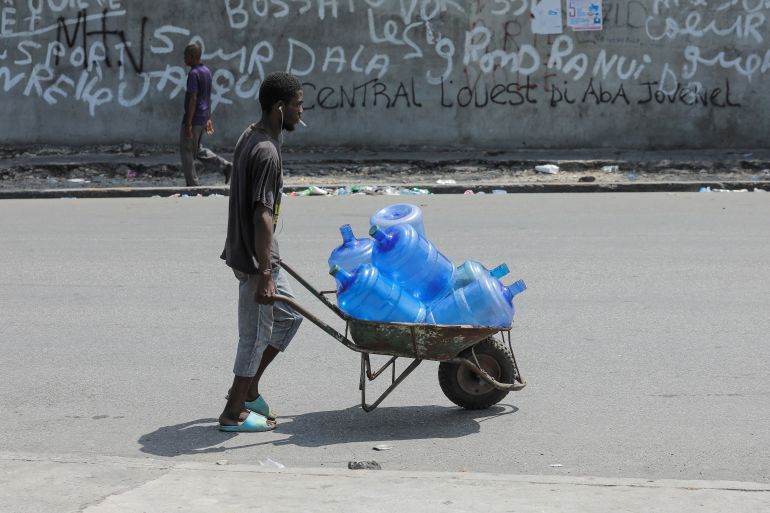Haiti’s public health crisis deepens as cholera cases reported
Haiti reports at least seven suspected deaths as outbreak hits amid rising gang violence, limited fuel and water access.

Haiti has reported at least two confirmed cases of cholera, local health officials and the World Health Organization (WHO) said, raising concerns that the disease will spread amid worsening gang violence and insecurity in the Caribbean nation.
In a statement on Sunday, the Pan American Health Organization (PAHO), a branch of the WHO, said the two confirmed cases were reported in the greater Port-au-Prince area, while “clusters of suspected cases and deaths” also were under investigation.
Keep reading
list of 3 itemsThousands protest in Haiti over insecurity, rising costs
Haitian children who escaped gang violence take shelter in school
“As of 2 October 2022, more than 20 suspected cases of cholera, including 7 fatalities … were detected by healthcare personnel,” PAHO said.
A day earlier, Haiti’s public health and population ministry said one case was confirmed in an area of the capital, Port-au-Prince, while several other suspected cases were reported in Cite Soleil, a neighbourhood of the capital that has seen increased violence in recent months.
“Cholera is something that can spread very, very quickly,” Laure Adrien, director-general of Haiti’s health ministry, warned during a news conference.
Haiti has ONLY 2 confirmed cases of cholera according to the Health Ministry General Director, Laure Adrien, who spoke to me on the phone at 11:28 PM on Sunday. I then asked, how many suspected cases, he replied : "I cannot tell you right now as its an ongoing situation".
— Widlore Mérancourt (@Widlore) October 3, 2022
Haiti last reported a case of cholera in January 2019, after a 2010 outbreak linked to a United Nations peacekeeping mission killed approximately 10,000 people and infected about 820,000.
Cholera is an illness that is caused by drinking water or eating food contaminated with cholera bacteria. It can trigger severe diarrhoea as well as vomiting, thirst and other symptoms.
“In an epidemic, the source of the contamination is usually the feces of an infected person that contaminates water or food. The disease can spread rapidly in areas with inadequate treatment of sewage and drinking water,” the US Centers for Disease Control and Prevention (CDC) says on its website.
Haiti is experiencing a worsening public health and safety crisis as armed gangs have erected road blockades in and around Port-au-Prince in anger over fuel price hikes, cutting residents and medical facilities off from access to clean water and gas.
Last week, a local rights group said the blockades had cut communities north of the capital off from clean drinking water and other needed supplies for four days. Hospitals also warned that they would have to reduce staffing and services due to a lack of fuel.
“Some hospitals are unable to admit new patients and are preparing to close,” the United Nations Children’s Fund (UNICEF) said on September 26.
Gang violence has worsened in Haiti since the assassination of President Jovenel Moise in July of last year, which plunged the country into deeper political instability.
The electricity supply from Haiti’s grid also has become so unsteady that most businesses and offices cannot maintain operations without power provided by diesel generators.
“In the context of a security crisis, the population … may have very limited access to safe water and health services,” PAHO warned on Sunday. “These factors would have an impact on the dynamics of the cholera resurgence and on the severity of the disease in patients with acute diarrhea.”
In the country’s 2010 cholera outbreak, the first viral infections were detected around the Artibonite River, where UN peacekeepers had dumped fecal matter. It was not until 2016 that the UN officially recognised its role in the epidemic’s start.
“On behalf of the United Nations, I want to say very clearly we apologise to the Haitian people,” then-UN Secretary-General Ban Ki-moon said in December of that year.
In its statement on Saturday, Haiti’s public health and population ministry said it was actively investigating the cholera outbreak and urged any residents who develop acute diarrhoea to immediately seek medical attention.
The UN said on Sunday that it was “supporting efforts by the Government of Haiti to contain an outbreak of cholera and provide life-saving measures”.
#Haiti has detected CHOLERA in our midst.
Cholera was brought in by UN soldiers from Nepal a few years ago causing the death of thousands of Haitians.
Now it’s back.
When there is very little potable water.
When hospitals are closing.
When GVT inefficiency is the norm. pic.twitter.com/9hHuaxUs6X— Monique Clesca (@moniclesca) October 3, 2022